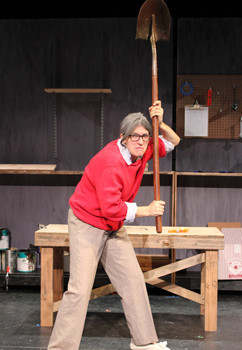There’s a World of Wackiness With a Dash of the Grotesque In “Fuddy Meers,” Absurdist Family Comedy at Theatre Intime


FAMILY TIME: Gertie (Juliet Garrett) takes drastic action to help her amnesiac daughter remember the past and make sense of her life in Theatre Intime’s production of David Lindsay-Abaire’s absurdist comedy, “Fuddy Meers,” playing at the Hamilton Murray Theater on the Princeton University campus through October 5.
Imagine waking up every morning with no memory of your past, your identity, or your current life. Each day is a new start and a struggle to discover who you are in relation to family and the surrounding world. Theatre Intime’s current production of David Lindsay-Abaire’s Fuddy Meers takes its audiences on a wild journey in search of memory and truth along with its protagonist Claire, a middle-aged woman suffering from a rare form of psychogenic amnesia.
The world of this play is beyond bizarre. It’s a world of funhouse mirrors. That’s the “fuddy meers,” in the gibberish delivered by one of the characters whose speech is impaired because of a stroke. Claire’s dysfunctional family, with its array of physical and psychological deformities, goes far beyond the Sycamore family of You Can’t Take It with You or the Brewsters of Arsenic and Old Lace into the realm of wacky insanity and whimsical absurdity. Despite the larger-than-life, unsettlingly dark comic tone of the play, however, there is an underlying seriousness and dignity in Claire’s brave quest. The zany excesses of Christopher Durang — Betty’s Summer Vacation, in particular — and the work of Charles Ludlam’s Ridiculous Theatrical Company also come to mind, though Fuddy Meers is less sharp in its dialogue, humor, and social satire than the best of Mr. Durang and Mr. Ludlam.
A capable, energetic Theatre Intime undergraduate ensemble of seven, under the direction of Princeton University sophomore Tyler Lawrence, displays spirit and versatility in tackling this acclaimed 1999 off-Broadway hit. The 11 scenes are fast-paced and entertaining, with abundant laughter, and a sympathetic, engaging central figure.
Fuddy Meers, presenting an adventure-filled day in the life of Claire (Nathalie Ellis-Einhorn), begins as she wakes up in the morning, a blank slate, all memory erased. Her ever-cheerful husband (David Cruikshank) greets her with a cup of coffee and a book containing everything he thinks she needs to know about herself, her surroundings, and her life.
Suddenly a mysterious, scary, limping man (Pat Rounds) in black ski mask emerges from under the bed. He claims to be Claire’s brother and insists on taking her away to protect her from her husband. Claire and the audience are equally confused. The limping man and Claire drive to the house of Claire’s mother Gertie (Julie Garrett), who speaks only in gibberish as a result of a recent stroke, though she thinks and acts with complete clarity.
Next to join the gathering at Gertie’s house is Millet (Steven Tran), a sociopathic criminal who wants to be a zookeeper. He is inseparable from his outspoken, foul-mouthed hand puppet. Soon afterwards the odd assemblage is completed when the pursuing husband Richard and their pot-smoking 17-year-old son Kenny (Matt Barouch) arrive, along with a peculiar, claustrophobic woman police officer, whom they kidnapped after she attempted to stop them en route.
Violence (by knife, pistol, shovel, hot bacon grease, sewing needle, hack saw), humor, and extremes of eccentricity abound, as Claire struggles to overcome her memory lapses and the deceptions and dysfunctions of the characters who surround her in her quest to discover the truth about her past and actual relationship to these people who attempt to control her life.
Ms. Ellis-Einhorn provides a solid focal point for the proceedings. A bit more energy and intensity in this character would help her, the only “normal” character, to capture the audience’s full attention amidst the competing crazies.
Mr. Rounds as the primary antagonist is first-rate and forceful in his volatile, psychopathic demeanor. Funny and frightening at the same time, disfigured in face and behavior, this character drives the plot and consistently commands the audience’s interest.
Mr. Cruikshank’s cheery, Mr. Self-Help-Manual husband is appropriately cloying and amusing in his character incongruities, while Mr. Barouch’s son-from-hell Kenny is on-target in characterization, humorous in his outrageous rudeness and ultimately valuable in his truth-telling.
Ms. Garrett’s high-powered grandmother skillfully handles the demands of extensive dialogue in gibberish and succeeds in communicating with dynamic force and even clarity with her daughter Claire, with the other characters in the play, and with the audience. Mr. Tran and Ms. Coke provide strong support in their sometimes disturbing, often surprising, and consistently amusing, madcap roles.
Mr. Lawrence has directed with understanding, focus, and appropriately swift pacing, though the opening night set changes could have benefited from greater speed and efficiency.
Seen through Claire’s eyes, Fuddy Meers, according to the playwright, is “a world of incomplete pictures and distorted realities.” Set design here by Wesley Cornwall with lighting by Marissa Applegate, original music by Sam Kaseta, sound design by Charlotte Sall, and costumes by Julie Aromi fulfills this goal with minimal unadorned representations of the locales of the play. The set is functional, though a bit more stylization, surrealism, other-worldliness might help to further embrace the mood of this play.
In his notes in the script Mr. Lindsay-Abaire calls this play ”a world of mirrors and memories … a world where mad fun and genuine danger are wrapped around each other.” This youthful Theatre Intime company brings Fuddy Meers to life with energy and talent and offers an evening of memorable madness and entertainment.

